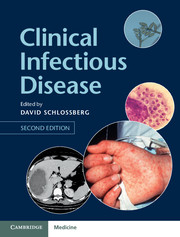Book contents
- Frontmatter
- Dedication
- Contents
- List of Contributors
- Preface
- Part I Clinical syndromes: general
- Part II Clinical syndromes: head and neck
- Part III Clinical syndromes: eye
- Part IV Clinical syndromes: skin and lymph nodes
- Part V Clinical syndromes: respiratory tract
- Part VI Clinical syndromes: heart and blood vessels
- Part VII Clinical syndromes: gastrointestinal tract, liver, and abdomen
- Part VIII Clinical syndromes: genitourinary tract
- Part IX Clinical syndromes: musculoskeletal system
- Part X Clinical syndromes: neurologic system
- Part XI The susceptible host
- Part XII HIV
- Part XIII Nosocomial infection
- Part XIV Infections related to surgery and trauma
- Part XV Prevention of infection
- Part XVI Travel and recreation
- 116 Advice for travelers
- 117 Fever in the returning traveler
- 118 Systemic infection from animals
- 119 Tick-borne disease
- 120 Recreational water exposure
- 121 Travelers’ diarrhea
- Part XVII Bioterrorism
- Part XVIII Specific organisms: bacteria
- Part XIX Specific organisms: spirochetes
- Part XX Specific organisms: Mycoplasma and Chlamydia
- Part XXI Specific organisms: Rickettsia, Ehrlichia, and Anaplasma
- Part XXII Specific organisms: fungi
- Part XXIII Specific organisms: viruses
- Part XXIV Specific organisms: parasites
- Part XXV Antimicrobial therapy: general considerations
- Index
- References
116 - Advice for travelers
from Part XVI - Travel and recreation
Published online by Cambridge University Press: 05 April 2015
- Frontmatter
- Dedication
- Contents
- List of Contributors
- Preface
- Part I Clinical syndromes: general
- Part II Clinical syndromes: head and neck
- Part III Clinical syndromes: eye
- Part IV Clinical syndromes: skin and lymph nodes
- Part V Clinical syndromes: respiratory tract
- Part VI Clinical syndromes: heart and blood vessels
- Part VII Clinical syndromes: gastrointestinal tract, liver, and abdomen
- Part VIII Clinical syndromes: genitourinary tract
- Part IX Clinical syndromes: musculoskeletal system
- Part X Clinical syndromes: neurologic system
- Part XI The susceptible host
- Part XII HIV
- Part XIII Nosocomial infection
- Part XIV Infections related to surgery and trauma
- Part XV Prevention of infection
- Part XVI Travel and recreation
- 116 Advice for travelers
- 117 Fever in the returning traveler
- 118 Systemic infection from animals
- 119 Tick-borne disease
- 120 Recreational water exposure
- 121 Travelers’ diarrhea
- Part XVII Bioterrorism
- Part XVIII Specific organisms: bacteria
- Part XIX Specific organisms: spirochetes
- Part XX Specific organisms: Mycoplasma and Chlamydia
- Part XXI Specific organisms: Rickettsia, Ehrlichia, and Anaplasma
- Part XXII Specific organisms: fungi
- Part XXIII Specific organisms: viruses
- Part XXIV Specific organisms: parasites
- Part XXV Antimicrobial therapy: general considerations
- Index
- References
Summary
Whether for business, tourism, study, or aid work, more individuals are traveling to more parts of the world. The World Tourism Organization estimates that in 2011, there were 990 million international tourist arrivals worldwide. Health problems associated with travel are common, especially in developing countries where as many as 22% to 64% of travelers self-report a travel-associated health problem and 8% seek healthcare while traveling or after return. Healthcare providers can play a critical role in minimizing the risk of illness and injury during travel.
General approach
While administration of travel-related vaccinations and malaria prophylaxis remain cornerstones of the pre-travel consultation, providing advice on managing chronic medical conditions, food and water hygiene, physical safety, and disease vector avoidance is also important. Noninfectious causes of morbidity and mortality such as injury and exacerbation of chronic illness are typically the most common health issues travelers encounter. Important considerations include:
Pre-existing medical conditions, current medications, and allergies
Itinerary, including details of travel within countries, duration of stay, and sequence of countries visited
Purpose of travel, accommodations, and activities
Previous vaccination history and recommended vaccines for the itinerary
Need for prophylactic and self-treatment medications, including those for malaria prevention, treatment of travelers’ diarrhea, and altitude sickness.
Referral to a travel health specialist should be considered, particularly for medically complex travelers, for those traveling to developing nations, and when travel-specific vaccines are indicated. Since vaccines typically take 10 to 14 days to elicit full immune responses, and some require a primary series to become effective, travelers should ideally be evaluated in a travel clinic at least 4 to 6 weeks prior to departure. However, when this is not possible travelers should still be seen, even when travel is imminent.
- Type
- Chapter
- Information
- Clinical Infectious Disease , pp. 778 - 784Publisher: Cambridge University PressPrint publication year: 2015



